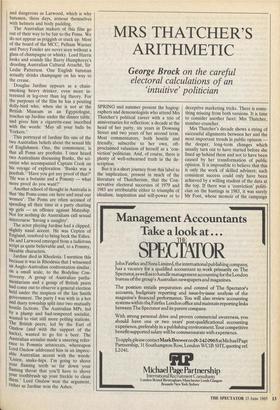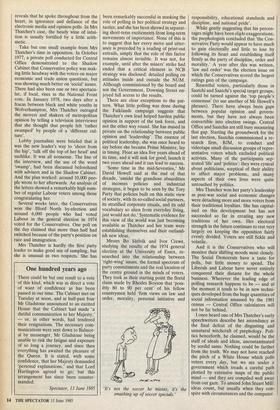MRS THATCHER'S ARITHMETIC
George Brock on the careful
electoral calculations of an 'intuitive' politician
SPRING and summer present the hagiog- raphers and demonologists who attend Mrs 'Thatcher's political career with a trio of anniversaries for reflection: a decade at the head of her party, six years in Downing Street and two years of her second term. Most commentators, both hostile and friendly, subscribe to her own, oft- proclaimed valuation of herself as a 'con- viction' politician. And, of course, there is plenty of well-rehearsed truth in the de- scription.
But it is a short journey from this label to the implication, present in much of the literature of Thatcherism, that the Con- servative electoral successes of 1979 and 1983 are attributable either to triumphs of idealism, inspiration and will-power or to deceptive marketing tricks. There is some- thing missing from both versions. It is time to consider another facet: Mrs Thatcher, number-cruncher.
Mrs Thatcher's decade shows a string of successful alignments between her and the most important trends in public opinion — the deeper, long-term changes which usually turn out to have started before she lined up behind them and not to have been caused by her transformation of public opinion. It is impossible to believe that this is only the work of skilled advisers; such consistent success could only have been achieved by a willing student of the data at the top. If there was a 'conviction' politi- cian on the hustings in 1983, it was surely Mr Foot, whose memoir of the campaign reveals that he spoke throughout from the heart, in ignorance and defiance of the electronic media and opinion polls. In Mrs Thatcher's case, the heady wine of intui- tion is usually fortified by a little arith- metic.
Take but one small example from Mrs Thatcher's time in opposition. In October 1977, a private poll conducted for Central Office demonstrated to the Shadow Cabinet that Conservative policy was mak- ing little headway with the voters on major economic and trade union questions, but was showing much better on 'social' issues. There had also been one or two spectacu- lar, if local, rises in the National Front vote. In January 1978, two days after a fracas between black and white youths in Wolverhampton, Mrs Thatcher outraged the movers and shakers of metropolitan opinion by telling a television interviewer that she thought that people felt `rather swamped' by people of a 'different cul- ture'.
Lobby journalists were briefed that it was the new leader's way to 'shoot from the hip', 'talk off the top of her head' and suchlike. It was all nonsense. The line of the interview, and the use of the word 'swamp', had been discussed beforehand with advisers and in the Shadow Cabinet. And the plan worked: around 10,000 peo- ple wrote to her afterwards. An analysis of the letters showed a remarkably high num- ber of regular Labour voters among those congratulating her.
Several weeks later, the Conservatives won the Ilford North by-election and around 6,000 people who had voted Labour in the general election in 1974 voted for the Conservatives. One poll on the day claimed that more than half had switched because of the party's position on race and immigration.
Mrs Thatcher is hardly the first party leader to make good use of sampling, but she is unusual in two respects. She has been remarkably successful in masking the role of polling in her political strategy and tactics; and she has been shrewd in separat- ing short-term excitements from long-term movements of importance. None of this is to suggest that her every move and utter- ance is preceded by a reading of print-out entrails, simply that the role of this factor remains almost invisible. It was not, for example, until after the miners' strike had ended that a critical element in NCB strategy was disclosed: detailed polling on attitudes inside and outside the NUM. Although commissioned by the board and not the Government, Downing Street en- joyed full access to the results.
There are clear exceptions to the pat- tern. What little polling was done during the Falklands campaign suggests that Thatcher's own lead helped harden public opinion in support of the task force, and not the other way round. She has mused in private on the relationship between public opinion and `leadership'. The essence of political leadership, she was once heard to say before she became Prime Minister, lay in timing. Float an idea five years ahead of its time, and it will sink for good; launch it two years ahead and it can lead to success.
'Some time in the mid-Seventies,' Mr David Howell said at the end of that decade, `amidst the grandiose absurdities of incomes policies and industrial strategies, it began to be seen by the Tory Party that policies built on this static view of society, with its so-called social partners, its stratified corporate rituals, and its odd vocabulary so alien from everyday living, just would not do.' Systematic evidence for this view of the world was just becoming available as Thatcher and her team were establishing themselves and their outland- ish new ideas.
Messrs Bo Sarlvik and Ivor Crewe, studying the results of the 1974 general election at the University of Essex, re- searched into the relationship between 'right-wing' issues, the formal spectrum of party commitments and the real location of the centre ground in the minds of voters. They took as their starting point the florid claim made by Rhodes Boyson that 'poss- ibly 80 to 90 per cent' of his fellow countrymen held 'firm views on law and order, morality, personal initiative and 'It's not the soccer he misses, it's the smashing up of soccer specials.' responsibility, educational standards and discipline, and national pride'.
While gently suggesting that his percen- tages might have been slight exaggerations,
the psephologists concluded that 'the Con- servative Party would appear to have much to gain electorally and little to lose by following its heart and establishing itself firmly as the party of discipline, order and morality.' A year after this was written, `law and order' was the election issue on which the Conservatives scored the largest ratings gain of the campaign.
Resentful voters, particularly those in Saatchi and Saatchi's special target groups, could be turned against the 'top people's consensus' (to use another of Mr Howell's phrases). There have always been gaps between popular opinion and govern- ments, but they have not always been convertible into election swings. Central Office and Saatchis are still busy measuring that gap. Starting the groundwork for the last election, Saatchis commissioned a re- search firm, BJM, to conduct and videotape small discussion groups of repre- sentative voters which excluded political activists. Many of the participants sep- arated 'life' and 'politics': they were cynical about politicians, sceptical of their ability to affect major problems, and many aspects of their own lives were quite untouched by politics.
Mrs Thatcher won her party's leadership as post-war social and economic changes were detaching more and more voters from their traditional loyalties. She has capital- ised on this development but has not succeeded so far in creating any new traditions of her own. Her electoral strength in the future continues to rest very largely on keeping the opposition fairly evenly divided. Voters are still fickle and volatile.
And it is the Conservatives who will monitor their shifting moods most closely. The Social Democrats have a taste for polls, but little money to spend. The Liberals and Labour have never entirely conquered their distaste for the whole business. Wherever the leading edge of polling research happens to be — and at the moment it tends to be in new techni- ques developed from the huge quantities of social information amassed by the 1981 census — Central Office calculators will not be far behind.
I once heard one of Mrs Thatcher's early speechwriters describe her ascendancy as the final defeat of the disgusting and unnatural witchcraft of psephology. Poli- tics henceforth, he claimed, would be the stuff of ideals and ideas, uncontaminated by sordid sums. Nothing could be farther from the truth. We may not have reached the pitch of a White House which polls voters every day, but we are under a government which treads a careful path plotted by extensive maps of the public mind — and they are compiled well away from our gaze. To amend John Stuart Mill: ideas count, but usually when they con- spire with circumstances and the computer.



















































 Previous page
Previous page